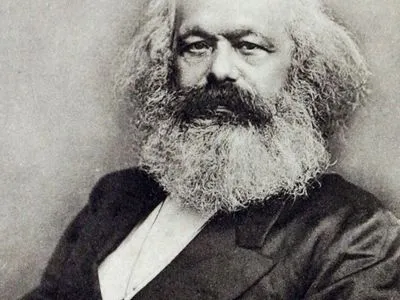Christopher S Grenda
Christopher S Grenda holds a doctorate in history and has enjoyed teaching history for 20 years and counting.
Marxism involves mental unwellness. It requires mental unhealth. That is not hyperbole or rhetoric. Mental unhealth is part of the logic of Marxist theory and practice today – ie, praxis. And that logic is grounded in the writings of Karl Marx, as well as later Marxists and Marxist-inspired literature.
The logic of Marxist practitioners goes like this: We need to alienate people from society because society is alienating. We need to alienate people from the institutions and practices of society because society is alienating them from themselves, from what Marx called their own “species being”.
The logic is pernicious and circular, but not that hard to grasp. Again, it goes like this: We need to estrange people from their social attachments because those attachments construct a bourgeois order which estranges them from each other and, most importantly, from themselves. Hence Marx’s description of the bourgeois order in his Economic and Philosophical Manuscripts (1844): “One man is estranged from the other, as each of them is from man’s essential nature.”
One’s social attachments vary, from family and friends to institutions, culture and social practices. The most important of these attachments, though, is the family. It is the foundational attachment. As the most private of domains, the family is the beginning of the experience of attachment itself, precipitating and forming the deepest feelings of love, loyalty, and trust.
The family is the foundation of the bourgeois order. As a private domain, it embodies separateness from society, an intimate sphere of relations residing within autonomous sovereign space, recognized by others as private property. Yet as the beginning of the experience of attachment itself, the family also provides a moral compass in helping direct individuals in their social development. It constitutes the capacity from which healthy private attachments develop into wider social connections and affinities. The family is both a domain of private property and a moral compass for social stability. It is the foundation of the bourgeois order.
According to Marxist praxis, though, the bourgeois order is an estranging world of false consciousness. It creates in each member a distorted self-understanding, with each being a product of and captive to bourgeois constructions. In objective form, those constructions inhere in social divisions, originally conceived in terms of labor and then in terms of race, gender, etc.
In subjective form, those constructions beget inner division, estranging the self from itself. The result is a society rife with contradictions, manifest as social conflicts, which are irresolvable short of estrangement – “liberation” – from the estranging order itself. As Mao Zedong explained, in “capitalist society contradictions find expression in acute antagonisms and conflicts” which “cannot be resolved by the capitalist system itself”.
The bourgeois order, in other words, is systemically estranging. It creates but cannot resolve its own conflicts, in either objective or subjective form. Resolution requires the negation of bourgeois thinking, the transcending of bourgeois consciousness, what today is often called “reimagining”.
This logic of Marxist praxis means that a child’s questions or confusions about her self-understanding – about her own identity – cannot be resolved within the framework of the bourgeois family, where parents bear primary responsibility for the child’s physical and emotional development. That family is but a construct and piece of the bourgeois system of divisions, which is what distorted her “self” to begin with. Bourgeois families, as private domains, embody division – mutually separate sovereign spaces. The bourgeois order is a system of such estranging privacies. Marxism requires its negation.
That’s why Marx described the “transcendence of private property” as “the real appropriation of the human essence”. Actualizing that essence, Marx explained, requires the negation of all distinctions “between man and nature and between man and man”, “between existence and essence, between objectification and self-confirmation, between freedom and necessity, between the individual and the species”. Consider that last example carefully.
The aspiration to negate the distinction between the individual and the species was ruthlessly pursued in the 20th century, to devastating ends. It meant, and means, negating the private domains of sovereign spaces – those estranging privacies at the heart of the bourgeois order. And now here, in the 21st century, we continue to hear this nonsense “that we have to break through our kind of private idea that kids belong to their parents or kids belong to their families, and recognize that kids belong to whole communities”. We have prominent politicians saying, “When you see our kids, and I truly believe that they are our children, that they are the children of our country, of our communities…” And we have spokespeople proclaiming, “These are kids. These are our kids. They belong to all of us.”
The message is clear. The bourgeois family stands in the way. It embodies privacy, separateness and sovereign space, and thereby hinders the negation of distinctions. It distorts a child’s self-understanding by subjecting him to systemic distinctions – which estrange him from himself, from his own essence. It precludes a genuine exploration of “his” self by instilling the sexual distinction at the heart of the bourgeois family, the gender binary.
That binary cannot be resolved within the bourgeois order. It must be negated… through the “teaching” of gender and sexual identities to children in schools. New imaginings promise vulnerable children the resolution of their confusions with accolade-and-flag-worthy identities – to estrange them from the estranging binary. The child’s family of which that binary is a constituent component then becomes dicey terrain.
Either parental affirmation and pharmacology follow or fractures emerge in the deepest sense of love, loyalty, and trust we humans experience as children – with parents. These fractures strip part of the soul. They break part of the psyche. It’s like when a devoted spouse realizes the systemic infidelity of a partner, but has to experience the resulting rupture equipped only with the emotional maturity of a child.
To whom the child shifts the now fractured sense of love, loyalty and trust is important, but secondary. It is the experience of the fracture itself that begins the process of mental unhealth – the breaking of foundational attachments, and the ensuing corrosion in the building blocks of healthy development. That’s the logic of the Marxist praxis of mental unhealth these days.
The process of breaking foundational attachments is just that, a process. It unfolds over time, in stages, as a gradual shift from one consciousness to another.
Marxism is a philosophy of consciousness. Marx’s rejection of idealism sometimes obscures this fact. Marx described man as creating himself, as duplicating himself, conceiving first in consciousness what he then actualizes in reality: “for he duplicates himself not only, as in consciousness, intellectually, but also actively, in reality, and therefore he sees himself in a world that he has created”. For Marx, thinking creates action which creates reality: “The criticism of religion disillusions man, so that he will think, act and fashion his reality.”
Subsequent Marxists developed this focus on consciousness. Seeking insight as to why revolutionary consciousness failed to materialize among the proletariat, they turned to the study of consciousness itself. Georg Lukács was one such figure. Lukács was a Hungarian Marxist who, through much of the 20th century, sought to precipitate what he called “a total break with every institution and mode of life stemming from the bourgeois world”.
Lukács understood the potency of sexual consciousness to advance this “break”. As Deputy Commissar for Cultural and Educational Affairs in Hungary’s socialist government in 1919, he introduced programs of sex education in Hungary’s public schools, reportedly with lectures and literature on love and intercourse. As a fellow traveler explains, “The Commissariat established a sex education program aimed at schoolchildren – the first of its kind in deeply Christian Hungary”. The program included a “Fable Department,” which “organized traveling puppet shows” for the children, along with “afternoons of fables” in which artists “produced drawings to illustrate the various themes” so that children were “exposed to ‘beautiful and instructive’ culture”. Sound familiar?
Yet Lukács’s contribution to the study of consciousness far exceeds Hungary’s short-lived socialist experiment. Lukács studied the mind and its subjective states. He described the bourgeois order in subjective terms, as a mental prison: “all those who remain imprisoned within the confines of capitalist thought … hold fast to necessity which they see as a law of nature”. The prison precluded the type of reimagining of oneself and society so in vogue today. As a result, the bourgeois-confined “reject as impossible the emergence of anything that is radically new of which we can have no experience”.
The goal was to pursue the radically new, to effect a prison break, to transcend the confines of bourgeois consciousness. Changing consciousness means changing perception and thinking. And this, Lukács understood, requires a calibrated process, a way to lead the mind through modifications – gradations and stages of mental conversion – in order to transition from one consciousness to another. Lukács called these gradations of mental reform a “precise index” of “the diverse stages of consciousness”.
The study and indexing of stages of consciousness explains why a prominent theorist describes Lukács’s History and Class Consciousness (1923) as one of the “founding documents of the discourse of Marxist humanism”. The other document was Marx’s Economic and Philosophical Manuscripts. Together, these texts laid the groundwork for a discourse which combines “sexual humanism” with “queer Marxism”.
The key, as a “pioneer of Queer Marxism” explains, is “Lukács’s definition of the human”. That definition stems from the Marxist tenet that humans are incomplete and engage in a continual process of self-creation. The process involves the dialectical relationship between human consciousness and society. It sounds complex, but isn’t that hard. It is simply a feedback loop. It goes like this: Consciousness creates social reality. It actualizes in society what it first conceives in the mind – like an architect conceiving and creating a building, an engineer conceiving and creating fiber optics, or an activist conceiving and creating intersectional identities.
The new reality then feeds back new experiences to humans which modify their prior consciousness. The new reality precipitates newer ideas – newer ways of building, newer ways of communicating. It creates newer perceptions and potentialities – newer ways of thinking and creating identities. The actualizing of last year’s identities precipitates the conceiving of new ones this year, as in this “tri-gender” announcement.
Above all, this dialectical process brings to consciousness a special kind of knowledge, the knowledge of being a special kind of being – the knowledge of being a creator. The dialectical process raises the awareness in consciousness that one possesses the power of creation, not only to create society, but in the feedback loop, to create new forms of human consciousness – newer ways of being human of which we had no previous experience. That’s what Marx meant when he said of the human: “He will move around himself as his own true Sun.”
Marx called this process of self-creation the “return of man to himself”. It was like a return to beginnings, a transcending of history, which reflects the radical penchant for restarting calendars, from the Jacobins to the Khmer Rouge. It required the negation of the distortions engrained in the bourgeois system of distinctions: “the return of man from religion, family, state, etc., to his human, ie social, existence”.
In Marxist praxis, self and society are but constructs. They are of human making. We make ourselves. We transform ourselves. Reality proffers no limits. It is but the product of human mind and will. Suggestions to the contrary are mental prisons, confining consciousness and distorting the self, dividing it, estranging it from its own powers of self-creation.
Throw children into the mix and it’s not hard to see where this goes. Children are vulnerable by definition. Their brains and minds are premature, still forming and developing, still growing, and thus emitting questions and confusions about self-understanding – about identity. A child’s consciousness is uniquely susceptible to coaching, to guidance through a process of mental reform, through stages of transition from one consciousness to another. Embedded within this “teaching” is initiation into a special kind of knowledge, knowledge about being a special kind of child, one with the power of self-creation.
The special knowledge lies beyond the confines of bourgeois thinking. It resides above the bastille of the bourgeois family, with its systemic distinctions of privacy and separateness. It requires the transcendence of the most bourgeois of all bourgeois distinctions, the one cementing the prison house – the gender binary.
Negating this binary requires estranging the child from the estranging separateness of the bourgeois family. The resulting fractures in the deepest sense of love, loyalty and trust children experience with parents are but glimmers of the emerging glow of liberation. The more the child experiences these fractures, and proceeds through this process of mental unhealth, the more the child feels desperate for support, understanding and friendship. The child then finds “solidarity” in a new community of the initiated, all of them eager for participatory hugs in the construction of a new shared consciousness. Virtual friends and affirming drug-induced care entrench this becoming state of childhood unhealth.
At which point, the next step of Marxist praxis kicks in. This is the step of inclusion, what the Marxist Herbert Marcuse called “Repressive Tolerance”. It requires, as Marcuse explained, tight restrictions on bourgeois teachings in schools: “new and rigid restrictions on teachings and practices in the educational institutions”. Marcuse, like Lukács, identified the problem: bourgeois ideas are mental prisons “which, by their very methods and concepts, serve to enclose the mind within the established universe of discourse and behavior”. The solution is “the systematic withdrawal of tolerance” from unwanted opinions. Ring a bell?
Here we see, again, the need to estrange from estrangement. The need to estrange people form the attachments of bourgeois society because those attachments estrange people from each other and, most importantly, from themselves, the consciousness of themselves as self-creators. Think through this logic: That which exists already suppresses – encloses the mind – and thus must be suppressed. That’s why Marcuse advocated for the “militantly intolerant”.
This is the logic of Marxist praxis which flows from Marx to Lenin to Mao and beyond. The bourgeois world is a dictatorship requiring a new dictatorship to suppress the dictators. Mao thus condemned the “dictatorship of the bourgeoisie” before explaining, “Our dictatorship is the people’s democratic dictatorship.” It “enforces dictatorship over the reactionary classes and elements and all those who resist”.
And now, in the 21st century, we hear the same Marxist message in American culture. The bourgeois family and its binary suppress and abuse children. It is dictatorship, as astutely explained in the following dispatch: “There aren’t CIS kids, okay. You’re telling your child, oh, you’re a boy, you’re a girl – this is a child. This is a free spirit that has not learned any of that bullshit until you force it on them. So cisness is the wound. Cisness is the delusion. Cisness is the lie. Cisness is the place of pain.” Liberation from this dictatorship requires adolescent and pre-pubescent self-creators: “You are forcing your kids to be boys and girls. We’re saying, ‘be whatever you are, baby’. Be free. Be water. Be light. Be sky. Be God.”
The same message appears on ABC’s Good Morning America. Bourgeois parents are dictators, suppressing the natural humanness of their own children: “It’s actually the anti-drag and anti-trans who are trying to groom and shape their children to feel shame over something innocent and natural and human, and drag is an antidote to that shame.”
Marxism for children involves mental unwellness. It fractures the deepest sense of love, loyalty and trust children experience – with parents. The experience of this fracture is a process of mental unhealth. That’s the logic of Marxist praxis these days.










